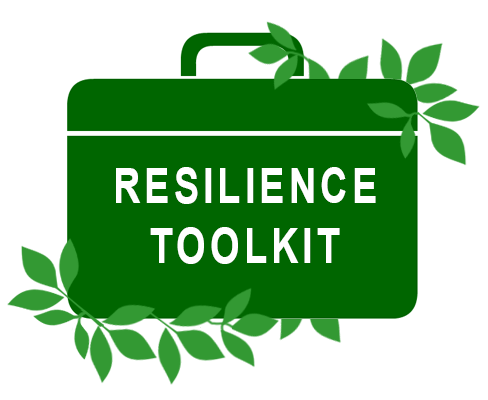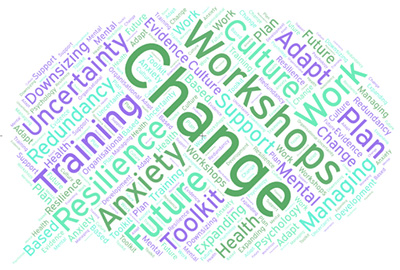
If you have more than 20 employees, you should have at least one person trained in how to support the mental health and wellbeing of the team in times of change.
Develop the skills, knowledge and confidence to build your own personal resilience and support colleagues, family and friends.
It Begins With You!
Blended Learning Packages Include:

Face-to-face Workshop

Resilience Toolkit
![]()
E-learning Courses
MANAGING CHANGE AND UNCERTAINTY WORKSHOP
You will learn the fundamental skills you need to both implement change yourself and adapt to changes thrust upon you in your personal and professional life.
With lessons drawn from the fields of clinical and organisational psychology, this evidence-based training is engaging, fun and above all, useful.

By the end of this workshop you will be able to:
- Take practical steps to improve your capacity to adapt to change
- Describe the ‘Stages of Change’ model widely used in organisational psychology
- Apply key principles of good practice in managing change and uncertainty
- Create a personal plan to manage uncertainty in the workplace and elsewhere
- Support others in adapting to change and and planning for an uncertain future.
From just £70 per person.
Training venues in Manchester.
Who should take this workshop?
This workshop is for anyone preparing to adapt to change in their personal or professional life. It is particularly useful for managers and team leaders who support others in responding to change and uncertainty.
The evidence-based training delivers clear, practical information advice and guidance along with the tools to help implement real change.
OTHER WORKSHOPS
Mental Health Body and Mind
This workshop takes a detailed look at the links between physical and mental health. The topics covered enable the participants to apply useful tips to establish every-day routines to improve both the mind and the body.
Understanding the specifics about how the body and mind work with one another – or against one another – can be a great motivator for making healthy choices and improving resilience and wellbeing.
This interactive workshop involves a small amount of group working and individual planning.
Who should attend?
Any staff wishing to improve their mental health and resilience. Particularly useful for managers and team leaders in a position to offer support and guidance to others.
Workshop Itinerary:
09.00 – Registration and coffee
09.30 – Introductions and overview
10.00 – Self-assessment and review
11.00 – Break
11.15 – Anatomy of the link between body and mind
12.30 – Lunch
13.15 – Putting together a personal plan
15.00 – Break
15.15 – Supporting others: The basics of ‘Mental Health First Aid’
16.00 – Summary and close
Managing Stress and Anxiety
This workshop is for anyone wishing to understand and apply the principles of managing the day to day causes of anxiety and how it impacts on stress in general. Content is evidence-based and follows information, advice and guidance used by professionals in the field of psychology and counselling. Applying the key learning points in this course will have a positive impact on your ability to manage (not eliminate) stress and anxiety.
Who should attend?
Any staff wishing to improve their mental health and their capacity to manage stress. Particularly useful for managers and team leaders in a position to offer support and guidance to others.
Workshop Itinerary:
09.00 – Registration and coffee
09.30 – Introductions and overview
10.00 – Self-assessment and review
11.00 – Break
11.15 – Identifying and managing triggers of stress and anxiety
12.30 – Lunch
13.15 – Internal controls and a resilient outlook
15.00 – Break
15.15 – Putting together a personal plan
16.00 – Summary and close
Change and Resilience
This workshop is for anyone wishing to understand and apply the principles of behaviour change and how it relates to building personal resilience. Attendees will cover the evidence-based ‘Stages of Change’ model used in behavioural science and popularised by clinical psychologists James Prochaska and Carlo Di Clemente.
The big takeaway from this course is the positive impact it will have on your ability to manage and adapt to change in any aspect of your life.
Who should attend?
Any staff wishing to understand a recognised model of behaviour change widely used in the field of psychology. It will be useful to managers and team leaders in a position to prepare for organisational change or offer support and guidance to others looking to effect behavioural changes in their personal or professional life.
Workshop Itinerary:
09.00 – Registration and coffee
09.30 – Introductions and overview
10.00 – Self-assessment and review
11.00 – Break
11.15 – The ‘Stages of Change Model’: Prochaska and Di Clemente
12.30 – Lunch
13.15 – Setting personal goals and developing an action plan
15.00 – Break
15.15 – Integrating key values into routines and behaviours
16.00 – Summary and close
Mental Health First Response
This workshop is for anyone wishing to become a Mental Health First Aider. Attendees cover the fundamentals of promoting good mental health and how to recognise symptoms of poor mental health. The workshop gives a good overview on how to respond when a colleague, or anyone else, is in crisis. With clear advice and guidance, attendees will become more confident in offering first line support to someone experiencing mental health problems.
Who should attend?
This workshop is open to anyone but is particularly relevant for managers and team leaders in a position to offer support and guidance to a person with signs of deteriorating mental health.
Workshop Itinerary:
09.00 – Registration and coffee
09.30 – Introductions and overview
10.00 – The fundamentals of good mental health first aid
11.00 – Break
11.15 – Recognising early signs of deteriorating mental health
12.30 – Lunch
13.15 – Opening a conversation with someone who may need support
15.00 – Break
15.15 – Listening skills and non-judgemental behaviour
16.00 – Summary and close
Resilient Families
This workshop is designed to help adults promote an understanding of what it means to be resilient within the family. Being a parent can be the most challenging, complicated and rewarding experience a person will have. The main focus of this workshop is to look at ways in which parents and guardians can help their children understand what it means to be resilient and to apply that learning to everyday experience.
This workshop covers the fundamentals of what it means to be resilient and how families can either promote or hinder development in this regard.
Who should attend?
Health and care workers engaged with families and anyone wishing to improve their understanding of resilience in the context of a family unit.
Workshop Itinerary:
09.00 – Registration and coffee
09.30 – Introductions and overview
10.00 – First principles of resilience
11.00 – Break
11.15 – How families can promote or hinder resilience
12.30 – Lunch
13.15 – Identifying key messages and activities
15.00 – Break
15.15 – Helping families put a plan together
16.00 – Summary and close

